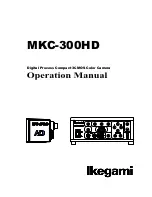
AXIS Q86 Series
Troubleshooting
Troubleshooting
Reset to factory default settings
重要
Reset to factory default should be used with caution. A reset to factory default resets all settings, including the
IP address, to the factory default values.
To reset the product to the factory default settings:
1. Disconnect power from the product.
2. Press and hold the control button while reconnecting power. See .
3. Keep the control button pressed for 15‒30 seconds until the status LED indicator flashes amber.
4. Release the control button. The process is complete when the status LED indicator turns green. The
product has been reset to the factory default settings. If no DHCP server is available on the network, the
default IP address is
192.168.0.90
.
5. Use the installation and management software tools to assign an IP address, set the password, and access
the video stream.
The installation and management software tools are available from the support pages on
.
It is also possible to reset parameters to factory default through the web interface. Go to Settings
Settings
Settings >
>
> System
System
System >
>
>
Maintenance
Maintenance
Maintenance and click Default
Default
Default .
Firmware options
Axis offers product firmware management according to either the active track or the long-term support (LTS) tracks.
Being on the active track means continuously getting access to all the latest product features, while the LTS tracks
provide a fixed platform with periodic releases focused mainly on bug fixes and security updates.
Using firmware from the active track is recommended if you want to access the newest features, or if you use Axis
end-to-end system offerings. The LTS tracks are recommended if you use third-party integrations, which are not
continuously validated against the latest active track. With LTS, the products can maintain cybersecurity without
introducing any significant functional changes or affecting any existing integrations. For more detailed information
about Axis product firmware strategy, go to
.
Check the current firmware
Firmware is the software that determines the functionality of network devices. One of your first actions when
troubleshooting a problem should be to check the current firmware version. The latest version may contain a
correction that fixes your particular problem.
To check the current firmware:
1. Go to the productʼs webpage.
2. Click the help menu
.
3. Click About
About
About .
18








































